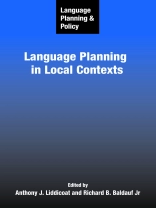Most academic work in language planning has focused on national and governmental activities relating to language – macro language planning. Language problems potentially exist at all levels of human activity, including the local contexts of communities and institutions – micro language planning. Micro language planning occurs in both formal and informal contexts and is based in and around the everyday language needs and aspirations of communities and institutions. Micro language planning also articulates with macro language planning: local language problems can provide the impetus for national level action and national level planning needs to be implemented at the local level and local needs and conditions shape implementation. This volume examines the ways in which language planning works as a local activity in a wide variety of contexts around the world and dealing with a wide range of language planning issues: corpus planning, language in education planning prestige planning, and status planning.
Spis treści
Introduction
1. Language Planning in Local Context: Agents, Contexts and Interactions – A. J. Liddicoat & R. B. Baldauf Jr.
2. Rearticulating the Case for Micro Language Planning in a Language Ecology Context – R.B. Baldauf Jr
Language Communities
3. From Language to Ethnolect: Maltese to Maltaljan – R. Bovingdon
4. Community-level Approaches in Language Planning: The Case of Hungarian in Australia – A. Hatoss
5. Micro-level Language Planning in Ireland – D. Mac Giolla Chríost
6. Preserving Dialects of an Endangered Language – S. Tulloch
7. The Ecological Impact of a Dictionary – A. J. Liddicoat
8. Prestige From the Bottom Up: A Review of Language Planning in Guernsey – J. Sallabank
9. Language Planning in American Pueblo Communities: Contemporary Challenges and Issues – C. P. Sims
10. Terminology Planning in Aboriginal Australia – J. Troy and M. Walsh
11. Changing the Language Ecology of Kadazandusun: The Role of the Kadazandusun Language Foundation – R. Lasimbang and T. Kinajil
Educational Contexts
12. Singaporean Education Planning: Moving From the Macro to the Micro – C. S. K. Chua
13. ‘Trajectories of Agency’ and Discursive Identities in Education: A Critical Site in Feminist Language Planning – J. Winter and A. Pauwels
14. University Students’ Attitudes Towards and Experiences of Bilingual Classrooms – C. van der Walt
15. Pacific languages at the University of the South Pacific – J. Lynch and F. Mugler
16. Micro Language Planning for Student Support in a Pharmacy Faculty – H. Marriott
Work Contexts
17. Negotiable Acceptability: Reflections on the Interactions Between Language Professionals in Europe and NNS Scientists Wanting to Publish in English – J. Burrough-Boenischn
18. On Language Management in Multilingual Companies in the Czech Republic – J. Nekvapil and M. Nekula
O autorze
Anthony Liddicoat is Professor in the Department of Applied Linguistics at the University of Warwick and Adjunct Professor in Justice and Society at the University of South Australia. His research interests include language and intercultural issues in education, discourse analysis, and language policy and planning. He is a Fellow of the UK Academy of Social Sciences, the Executive Editor of Current Issues in Language Planning and Co-editor of the book series Language and Intercultural Communication in Education (Multilingual Matters).












